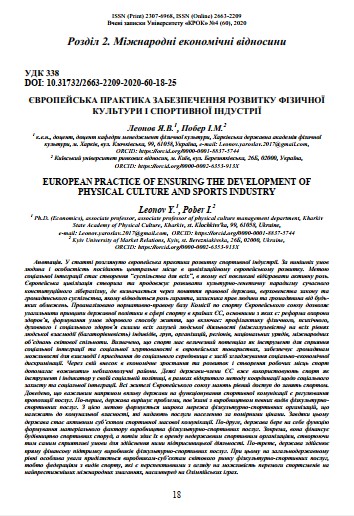EUROPEAN PRACTICE OF ENSURING THE DEVELOPMENT OF PHYSICAL CULTURE AND SPORTS INDUSTRY
DOI:
https://doi.org/10.31732/2663-2209-2020-60-18-25Keywords:
sports industry, strategic development, physical activity, state policy, sports activity, sports communication, tax policy, financingAbstract
The article considers the European practice of sports industry development. Under the current conditions, man and personality occupy a central place in European civilizational development. The goal of social integration is to create a "society for all" in which everyone is called to play an active role. European civilization has created and continues to develop the cultural and genetic paradigm of modern constitutional liberalism, defined by the rule of law, the rule of law and civil society, which is given the role of guarantor, defender of human rights and citizens from all restrictions. The regulatory framework of the European Commission for Sport of the European Union allows to generalize the principles of state policy in the field of sports in the EU, the main of which are: health care reform, healthy living conditions, including: prevention of physical, mental, spiritual and social health by all branches of human activity (intersectoral) at all levels of human interaction (multilevel) of individuals, groups, organizations, regions, national governments, international associations of the world community. It is determined that sport has a huge potential as a tool to promote social integration and social cohesion in European societies, provides citizens with opportunities to interact and join the social environment is a means of smoothing socio-economic discrimination. Through its contribution to economic growth and development and job creation, sport helps to "revitalize" disadvantaged areas. Some EU Member States already use sport as a tool and indicator in their social policy, as part of the open method of coordination on social protection and social inclusion. All residents of the European Union have equal access to sports. It is proved that an important direction of the state's influence on the functioning of sports communication is the regulation of the supply of services. First, the state solves problems related to the production of certain types of physical culture and sports services. To this end, a wide network of physical culture and sports organizations belonging to the communal property, which provide services to the population at reasonable prices, is being formed. As a result, the state becomes an active subject of sports mass communication. Secondly, the state assumes the function of forming the material factor in the production of physical culture and sports services. In particular, it finances the construction of sports facilities and then leases them to non-governmental sports organizations, thus creating favorable conditions for their business activities. Third, the state provides direct financial support to producers of physical culture and sports services. At the national level, special attention is paid to manufacturers in the world market of physical culture and sports services, sports federations, which are promising given the possibility of winning athletes at the most prestigious international competitions, especially at the Olympic Games.
Downloads
References
Andreff W, Stefan Szymanski, Handbook on the economics of sport, MPG Books Ltd, 2006. Bodmin, Cjrnwall, UK.
Геєць В. Феномен нестабільності – виклик економічному розвитку. 2020.
Двігун А. “Децентралізація: упровадження нової системи адміністративно-територіального устрою”, Экономический вестник Донбасса, 2019.
Портер М. Международная конкуренция: Конкурентные преимущества стран. 2019. Альпина Паблишер, Москва, Россия.
Data and statistics, Database Centers for Disease Control and Prevention. URL: https://www.cdc.gov/nccdphp/dnpao/division-information/data-stats/index.htm.
Database, Database European Сomission. URL: http://ec.europa.eu/eurostat/data/database.
Global Health Observatory data repository, “Database World Health Organization”. URL: http://apps.who.int/gho/data/node.main.A893?lang=en.
White Paper on Sport, “Database European Union Law”. URL: http://eur-lex.europa.eu/legal-content/EN/TXT/?qid=1389190214279&uri=CELEX:52007DC0391.
Sport statistics – 2020 edition, “Database European Сomission”. URL: http://ec.europa.eu/eurostat/web/products-catalogues/-/KS-07-17-123.
Міжнародна хартія фізичного виховання і спорту: Закон від 21.11.1978 №99-350, “База даних «Законодавство України» / ВР України”. URL: http://zakon3.rada.gov.ua/laws/show/42/2016.
Health and Participftion, “Database European Сomission”. URL: https://ec.europa.eu/sport/policy/societal-role/health-participation_en.
Proposal for a council recommendation on promoting health-enhancing physical activity across sectors, “Database Access to European Union Law”. URL: http://eur-lex.europa.eu/legal-content/EN/TXT/?qid=1389629458571&uri=CELEX:52013PC0603.
Europe 2020 strategy, “Database European Сomission”. URL: https://ec.europa.eu/info/business-economy-euro/economic-and-fiscal-policy-coordination/eu-economic-governance-monitoring-prevention-correction/european-semester/framework/europe-2020-strategy_en#thestrategysetouttargetsinthe5followingfields.



